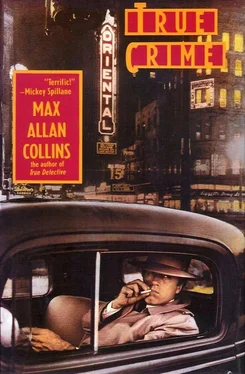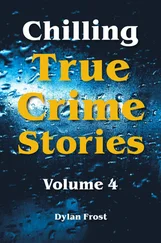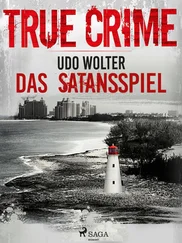I’d parked on the same side of the street as the Biograph, just to the right of the mouth of an alley. The marquee was glowing just down the street; between me and it was a grocery store, on the alley corner, and past that the tavern next to the theater. As I got out of my car, it occurred to me that just a few blocks down was the garage where the Saint Valentine’s Day Massacre had taken place. Small world.
I fell behind a family, father and mother and a boy of about ten and a girl of about eight — on a summer, non-school night, and in heat like this, parents taking their kids out this late wasn’t unusual — and was just passing the Goetz Country Club tavern when I noticed an ostentatious-looking car, a gray-and-black Pierce Arrow, parked along the curb. I looked down through the open window.
Melvin Purvis was behind the wheel.
He was lighting a cigarette with a hand that was shaking; just a little, but shaking. He wore a jaunty straw hat and blue sports coat. He looked like he should have a debutante next to him. Instead he had in the rider’s seat one of those college-boy agents from the Banker’s Building, who was now looking at me with wide, somehow frightened eyes.
I held my palms up and out, chest-high, and smiled a little.
Looking past his college-boy companion and out at me, Purvis, cigarette lit now, frowned like a housewife whose cake just fell, and motioned at me. I went around on his side and leaned against the car and smiled in at him.
“Hello, Melvin,” I said.
“What the hell are you doing here, Heller?” He squeezed off each word, his Southern accent vanished. His speech pattern reminded me of Walter Winchell’s, at least at that moment it did.
“Just thought I should check in with you, since I was in the neighborhood,” I said cheerfully. “Just for the record, I’m not Dillinger.”
His mouth fell open a little and his eyes glowed like the tip of his cigarette, which dangled from his mouth forgotten.
“I just thought I should point that out,” I said. “I’m in no mood to get shot.”
“You’re interfering with a government job, Heller. Get lost.”
“It’s a free country, Melvin. I thought I might take in the show.”
He glanced over at his companion and his Southern drawl suddenly replaced the clipped Winchell tone. “Agent Brown,” he said, “why don’t you accompany Mr. Heller from the premises.”
I leaned in and stared right into Purvis’ startled face and smiled; I could smell Sen-Sen on his breath. “Send him on out. I never broke a government agent’s arm before.”
“Are you threatening—”
“Promising. Promising a scene bigger than any that ever played that movie house. Want to risk blowing your stakeout over that?”
He bit the words off: “Go to the movie then. Go to hell.”
I shrugged. “I wouldn’t mind standing out here and watching the parade of humanity go by. A detective can always learn something by studying people, you know.”
He looked over at Agent Brown. “Get in the back seat.” Brown did that, and Purvis looked at me; his face looked more than ever like the chiseled kisser of a ventriloquist’s dummy — when he spoke, I was almost surprised my lips didn’t move. He said, “Get in on the rider’s side, Heller. If you’re going to be around, at least you can be under my watchful eye.”
“I know I’ll sleep better tonight for it,” I said.
He jerked with this thumb. “Go around and get in.”
I did.
“Nice car, Melvin,” I said.
“Shut up and don’t bother me.” He was intently studying each passerby. His technique was as subtle as a guy in the front row at a State Street burlesque house.
“Say, uh... Melvin?”
Without looking at me, he snapped, “What?”
“You’re going to burn yourself.”
Then he looked at the cigarette in his fingers, burned down to the point where it would soon sizzle against his skin, and nervously jumped, flicked it out the window.
“Melvin,” I said, suddenly feeling a little sorry for him. “Calm down. Take it easy.”
He looked at me expecting sarcasm, didn’t see any, sighed a little, nodded, and kept looking. He was wearing, in addition to that navy-blue sports jacket with white buttons, white slacks and white shoes. He had a white hanky in his sports jacket pocket; the initials MHP showed. He was as immaculately groomed as Frank Nitti, albeit in an Ivy League manner foreign to Al Capone’s successor.
But he was sweating like a wop; that much they had in common.
He glanced at me, and, in a peacemaking gesture, said, “Would you like a cigarette?”
“No thanks.”
It was 8:15 now. Agent Brown got out to use the phone in the tavern to call Cowley and report no sign yet of John Dillinger.
“Melvin?”
“Yes?”
“I stopped by the Banker’s Building.”
He nodded. “Cowley mentioned it when we called in, a while back.”
“Did he say I might stop by?”
He nodded again. “Advised we keep an eye out for you.”
“Did he tell you anything else?”
“No.”
“While you’re watching the folks pass by, mind if I tell you a little story?”
“I suppose not.”
And I told him how Frank Nitti had, in collaboration with Louis Piquett and Anna Sage and Sgt. Martin Zarkovich, put a man they called Dillinger on the spot. Set him up for execution.
Purvis was remarkably calm as I told him this.
“Much of what you say seems reasonable,” he said. “And, in truth, Sam Cowley did run some of this by me the other day. He admitted to me that his reaction to your... suppositions... was that we didn’t care where we got help in capturing this felon. I personally don’t believe the end justifies the means; but neither do I think one can work this side of the street without stepping in something occasionally.”
I didn’t know what to say to that; so I didn’t.
Purvis continued, all the while watching people stroll up to the Biograph box office to buy tickets. “What I don’t understand is your implication that the man we’re stalking tonight may not actually be Dillinger.”
“I’m not saying that’s the case,” I said. “Just a possibility. Frank Nitti’s pulled scams like this before.”
“It would be outrageous for Nitti and Piquett and company to dream they could get away with such a thing. I can’t believe they’d try.”
“You can protect yourself, in any event.”
He looked away from the people on the street, momentarily, and his eyes met mine. “How?”
“Don’t shoot Jimmy Lawrence tonight; and don’t let anyone else do it, either.”
His mouth made a tiny twitch and his eyes flickered and he looked back at the street, where people continued to approach the box office.
“Melvin,” I said. “What’s wrong? What aren’t you telling me?”
Brown wasn’t back yet from phoning in to Cowley. Purvis glanced toward the tavern to make sure he wasn’t on his way back yet; and then, with an exaggerated air of confidentiality, he said, “I will admit something to you... Sergeant Zarkovich and Captain O’Neill — neither sterling examples of law enforcement, I’ll grant you — took me to one side this afternoon.” He paused; puffed his latest cigarette.
“And?”
He exhaled. “He — Zarkovich, that is — told me that he wanted to go up to Dillinger, after the movie was over, and... blow his brains out, from behind.”
“I’m not surprised.”
“I was. I told them I’d put up with no such thing — but they were of the opinion that, having brought Anna Sage to us, the least we could do for them is allow them to ‘finish him off.’ Naturally I refused.”
“Naturally.”
“So I want you to know I’m not taking what you’ve said lightly, Heller. There will be no gunplay, unless initiated by the suspect. But if Dillinger offers any resistance, each man will be for himself. It will be up to each individual to do whatever he thinks necessary to protect himself in taking this man.”
Читать дальше












